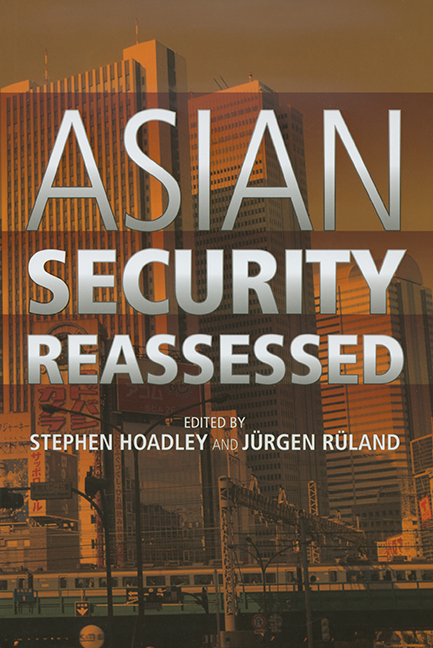Book contents
- Frontmatter
- Contents
- Acknowledgements
- About the Contributors
- List of Abbreviations
- Preface
- Part One Approaches to Asian Security
- Part Two Security Management by Asian States and Regional Institutions
- Part Three Non-Traditional Challenges to Asian Security
- 7 Weapons Proliferation in Asia
- 8 Conflicts over Natural Resources and the Environment
- 9 Ethnic Conflict, Separatism and Terrorism
- 10 Irregular Migration as a Security Issue
- 11 Globalization and Asian Financial Insecurity
- 12 Challenges to Human Rights and Civil Liberties
- Part Four New Concepts of Asian Security
- Index
8 - Conflicts over Natural Resources and the Environment
from Part Three - Non-Traditional Challenges to Asian Security
Published online by Cambridge University Press: 21 October 2015
- Frontmatter
- Contents
- Acknowledgements
- About the Contributors
- List of Abbreviations
- Preface
- Part One Approaches to Asian Security
- Part Two Security Management by Asian States and Regional Institutions
- Part Three Non-Traditional Challenges to Asian Security
- 7 Weapons Proliferation in Asia
- 8 Conflicts over Natural Resources and the Environment
- 9 Ethnic Conflict, Separatism and Terrorism
- 10 Irregular Migration as a Security Issue
- 11 Globalization and Asian Financial Insecurity
- 12 Challenges to Human Rights and Civil Liberties
- Part Four New Concepts of Asian Security
- Index
Summary
INTRODUCTION
The need for natural resources has given rise to conflicts in many parts of the world. As the World Commission on Environment and Development points out, “nations have often fought to assert or resist control over war materials, energy supplies, land, river basins, sea passages and other key environmental resources”. Malaquias observes that it is “not accidental that some of the nastiest wars in Africa are being fought in countries richly endowed with natural resources”. While there are no parallel cases in East and Southeast Asia to match the intensity and magnitude of the conflicts in some African countries, many conflicts have arisen either directly or indirectly over the control and use of natural resources. The concentration of rich natural resources in outlying parts of countries, especially in large countries with weak provincial administrative structures, can be a major contributor to calls for autonomy or breakaway in some countries.
Frequently, political and social disagreements about the sharing of economic benefits of natural resources assume major significance and often exacerbate existing religious, cultural and social tensions. Security of nations may be undermined by internal or external armed conflict or by terrorism, as well as by the weakening of economic systems, thereby making nations more vulnerable to attack. Geographic cultural diversity (for example, of ethnic minorities) and geographical inequality in natural resources available within countries and in different regions add to tensions. Furthermore, more economically developed regions and nations, to sustain economic growth, tend to exploit the natural resources and environments of less developed regions and nations. Perhaps as a precaution against attack from neighbours, small but resource rich countries such as Brunei spend a larger percentage of their GDP on defense than some of the larger countries such as China, Indonesia and Malaysia.
This chapter discusses the security issues and conflicts (both external and internal) over natural resources and the environment in East and Southeast Asia. The first section briefly discusses the resources of the region. A map locates some of the natural resources discussed. The second section deals with the conflicts related to the use and control of natural resources in the region. The nature and the magnitude of the conflicts between and within countries are dealt with. The third section discusses the responses and possible remedial action for these conflicts and the fourth section concludes the chapter.
- Type
- Chapter
- Information
- Asian Security Reassessed , pp. 187 - 210Publisher: ISEAS–Yusof Ishak InstitutePrint publication year: 2006



